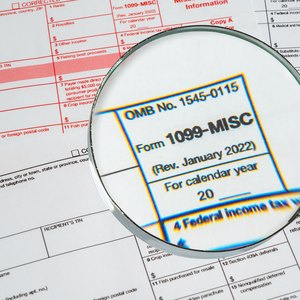
The Internal Revenue Service uses a series of 1099 forms to record payments from one entity or person to another. Form 1099-DIV is a common form used to report payment of dividends. Form 1099-INT is another form that records interest payments in excess of $10. IRS Form 1099-NEC was reintroduced in tax year 2020 after being retired back in 1982. It reports nonemployee compensation.
This type of income was reported on Form 1099-MISC through 2019. Form 1099-MISC isn't specific to one type of payment but reports several different kinds of payments when they exceed $600. These are examples of income reported on tax Form 1099-MISC and who would receive a copy with information to be included on their income tax returns.
Read More: What Is Form 1099-NEC?
Rents
You would issue an IRS Form 1099-MISC to the owner, recording the amount in box 1, if you pay rent directly to a property owner for your office space in 2022. You would not issue a 1099 for rent paid to property managers or real estate brokers. The property managers and brokers would issue 1099s to the property owners in this case.
Owners of machines, like earthmoving equipment, would receive 1099s when they rent their equipment for use in a trade or business. Renting a bulldozer for grading property to build houses would be an example. But renting a backhoe to excavate for a swimming pool in your backyard would not be reported. That’s a personal expense.
Farmers who lease out their land for grazing would get a 1099-MISC from the lessor.
Read More: What Happens if I Get a 1099 After I File My Taxes?
Prizes and awards for service provided by nonemployees as independent contractors are not reported on Form 1099-MISC but are reported in box 1 of Form 1099-NEC, the 1099 form for nonemployee compensation over $600.
Royalties
Royalty payments that you receive would be reported on a 1099-MISC with amounts reported in box 2 if you own oil and gas properties. A typical example would be a landowner who allows an oil company to drill wells on their property if the landowner receives a portion of proceeds as a percentage royalty from the sale of the crude oil produced.
Owners of intangible properties such as trademarks, copyrights and patents would also report royalty income from the sales or use of their properties.
Prizes and Awards
Winners of prizes and merchandise from game shows with fair market values of over $600 must report this income. The entity awarding the prizes will report the FMV in box 3, "Other Income," and give a copy to the winners. One downside is when the recipient does not receive cash but merchandise. The recipient may have to sell the award to come up with the cash to pay the taxes due.
Prizes and awards for service provided by nonemployees as independent contractors are not reported on Form 1099-MISC. They're reported in box 1 of Form 1099-NEC, the 1099 form for nonemployee compensation over $600. Prizes and awards to employees are reported on Form W-2.
Fishing Boat Proceeds
Fishing activity has its own category. Fishing boats with fewer than 10 crew members must report the fair market value of the proceeds of a catch for each crew member.
Medical and Health Care Payments
Payments made in the course of normal business to providers and physicians of medical or health services are reported. This category is one of the exceptions where payments to corporations are also reported on a 1099-MISC.
Substitute Payments in Lieu of Dividends or Interest
You may get a 1099 that reports any monies you receive as substitute payments in lieu of dividends or interest if you have a margin account with your stock broker. This situation arises when the brokerage firm has loaned your stock to a short-seller and a dividend has been paid before the short-seller closes the position. This could create an unfavorable tax situation.
Crop Insurance Proceeds
Farmers occasionally receive payments from insurance companies and federal disaster programs for destruction or damage to crops as a result of natural disasters. This income would normally be reported on the 1099-MISC for cash basis farmers in the tax year when the payments are received. However, Internal Revenue Code 451(f) allows farmers to defer reporting this income until the following tax year under certain conditions.
Gross Proceeds Paid to Attorneys
Suppose you win a lawsuit that was initiated in the course of your business, and the defendant’s insurance company pays the claim to your attorney. The insurance company would report the amount of this claim in box 10 of Form 1099-MISC and send a copy to your attorney.
A slight variation of this same process occurs when a person pays an amount in excess of $600 to a claimant’s attorney in connection with their business. The payee would be required to send the claimant a Form 1099-MISC with the payment reported in box 3. The payee would additionally send a Form 1099-MISC to the claimant’s attorney and report the amount paid as gross proceeds in box 10.
Excess Golden Parachute Payments
Some executives may receive compensation known as "golden parachutes" when a company experiences a change in control. The excess is reported in box 13 of Form 1099-MISC when the amount of this compensation exceeds a certain threshold. A copy is given to the discharged executive.
Read More: How Does a 1099 Form Work?
What About S-Corps, C-Corps and LLCs?
You're not required to issue 1099-MISC forms to C Corps and S Corps in most cases, but there are a few exceptions:
- Payments to attorneys
- Medical and healthcare payments
- Substitute payments in lieu of dividends or tax-exempt interest
LLCs that are taxed as sole proprietorships would receive 1099s, but they would not receive a 1099 if they're taxed as a C- or S-Corp. You'll know which is correct by looking at the Form W-9 submitted by the individual.
Distribution of 1099-MISC Forms
Form 1099-MISC comes with five copies that are distributed as follows:
- Copy A goes to the IRS.
- Copy 1 goes to the recipient’s state tax department.
- Copy B is kept by the recipient.
- Copy 2 goes along with the taxpayer’s state tax return.
- Copy C is kept by the taxpayer.
References
- IRS: Instructions for Forms 100-MISC and 1099-NEC
- Cornell Law School: Golden Parachutes
- Entrepreneur: Time to Send Out 1099s: What to Know
- Iowa State University: Special Rule for Taxing Crop Insurance and Disaster Payments
- IRS: Gross Proceeds Paid to Attorneys
- New York State Society of Certified Public Accountants: The IRS Resurrects Form 1099-NEC After a 38-Year Absence
Writer Bio
James Woodruff has been a management consultant to more than 1,000 small businesses. As a senior management consultant and owner, he used his technical expertise to conduct an analysis of a company's operational, financial and business management issues. James has been writing business and finance related topics for work.chron, bizfluent.com, smallbusiness.chron.com and e-commerce websites since 2007. He graduated from Georgia Tech with a Bachelor of Mechanical Engineering and received an MBA from Columbia University.

